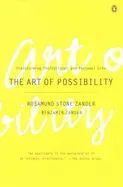
The Art of Possibility - by Rosamund and Benjamin Zander
ISBN: 0143001221Date read: 2020-11-15
How strongly I recommend it: 6/10
(See my list of 430+ books, for more.)
Go to the Amazon page for details and reviews.
Leadership coach and famous orchestra conductor collaborate on a book about relationships, art, personal development, children, and practice. Somewhat scattered but had some really interesting ideas.
my notes
Art is about rearranging us, creating surprising juxtapositions, emotional openings, startling presences.
Discouraged? = “What? You’ve been practicing it for three minutes, and you still can’t play it?”
It’s all invented anyway, so we might as well invent a story or a framework of meaning that enhances our quality of life and the life of those around us.
What assumption am I making, That I’m not aware I’m making, That gives me what I see?
What might I now invent, That I haven’t yet invented, That would give me other choices?
Speak to people not from a place of measuring how they stack up against your standards, but from a place of respect that gives them room to realize themselves.
You already got an A. Now tell, in as much detail as you can, the story of what will have happened to you that is in line with this extraordinary grade.
Report on all the insights they acquired and milestones they attained during the year as if those accomplishments were already in the past. Everything must be written in the past tense.
The attitude, feelings, and worldview of that person who will have done all she wished to do or become everything he wanted to be.
When we give an A we can be open to a perspective different from our own.
You certainly can change people.
“Who, actually, is doing the changing?”
The relationship.
When people play a game, they agree to a certain set of limitations to create a challenge.
Everything occurs in that context.
They challenge us to adapt and hone our skills to win in a distinctive environment that itself can be packed away, or left, once the game is over.
If the rules do not light up your life, put it away, take out another one you like better, and play the new game.
Only describe ourselves in the light of contribution.
Naming oneself and others as a contribution produces a shift away from self-concern and engages us in a relationship with others that is an arena for making a difference.
The conductor decides who is playing in his orchestra.
He can decide that they are bored and resigned, jaded and disaffected, or the tender and ardent lover of music.
Think of “personality” as a strategy for “getting out of childhood alive.”
One child may be sociable and outgoing, another may be quiet and thoughtful, but both are aimed at the same thing: to find a safe and identifiable niche in the family and the community and to position themselves to survive.
Winning ways: children learn to know themselves.
A child comes to think of himself as the personality he gets recognition for.
What would have to change for me to be completely fulfilled?
Practice being with the way things are. This calls upon us to distinguish between our assumptions, our feelings, and the facts.
Start from what is, not from what should be.
Without fleeing, blaming, or attempting correction.
There is only one of you in all of time, this expression is unique. And if you block it, it will never exist through any other medium and it will be lost. The world will not have it. It is not your business to determine how good it is nor how valuable nor how it compares with other expressions. It is your business to keep it yours clearly and directly, to keep the channel open.
If I cannot be present without resistance to the way things are and act effectively, if I feel myself to be wronged, a loser, or a victim, I will tell myself that some assumption I have made is the source of my difficulty.
Define yourself not as a piece, nor as the strategist, but as the board itself, the framework for the game of life.